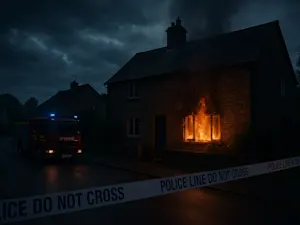
15 Fire Hazards You're Overlooking — And How to Fix Them
House fires are devastating, yet most are preventable with proper precautions. Modern homes burn faster than older ones, giving families only about three minutes to escape. But with a combination of awareness, planning, and small lifestyle changes, you can protect your home and loved ones. Here are 15 crucial tips to reduce your risk of a house fire.
1. Install and Maintain Smoke Alarms
Smoke alarms save lives — plain and simple. Install alarms on every floor, in each bedroom, and outside sleeping areas. Test them monthly and replace batteries annually. Homes without working smoke alarms account for 60% of home fire deaths.
2. Develop and Practice a Fire Escape Plan
A fire escape plan is non-negotiable. Map out two escape routes for each room, and practice drills with your household, including pets. Fires spread rapidly, and every second counts. Ensure windows are easy to open and that everyone knows where to meet outside.

3. Stay Focused While Cooking
Cooking is the leading cause of home fires, often because people leave the stove unattended. Always stay in the kitchen while frying, grilling, or broiling food. Keep flammable items like towels and paper far from the heat, and turn pot handles inward to prevent spills.
4. Keep Space Heaters at a Safe Distance
Portable heaters are convenient but risky. Keep them at least three feet away from furniture, curtains, and bedding. Purchase models with automatic shut-off features and avoid plugging them into extension cords, which can overheat.
5. Choose Fire-Resistant Materials for Renovations
If you're remodeling, consider materials like fiber cement siding, metal roofing, and tempered glass windows. These materials resist ignition and slow fire spread, giving your family more time to escape.
6. Inspect Electrical Systems Regularly
Outdated or damaged wiring is a silent fire hazard. Look out for flickering lights, warm outlets, or frequently tripped breakers. Hire a licensed electrician to check your system, especially in older homes. Installing arc-fault circuit interrupters (AFCIs) adds an extra layer of safety.
7. Keep Matches and Lighters Out of Reach
Children are naturally curious, which makes matches and lighters particularly dangerous. Store them high and out of sight, ideally in locked cabinets. Teach children about fire safety and the importance of treating fire tools responsibly.

8. Clean Dryer Vents Thoroughly
Dryer lint buildup is one of the most overlooked fire hazards. Clean the lint trap after every load, and have the entire vent system professionally cleaned at least once a year. Flexible foil ducts should be replaced with rigid metal ones to reduce risk.
9. Leverage Smart Home Technology
Smart devices can be lifesaving. Install smart smoke alarms that send alerts to your phone, and consider smart plugs that cut power to appliances left running. Some systems even shut down HVAC units to prevent smoke spread.
10. Be Cautious With Candles
Candles add ambiance but are a fire risk if left unattended. Use flameless LED candles for the same effect without the danger. If you do use traditional candles, keep them on sturdy surfaces, away from flammable materials, and extinguish them before leaving the room.
11. Use Fire Extinguishers Effectively
Every home should have at least one fire extinguisher, preferably in the kitchen and near the bedrooms. Learn the PASS method: Pull the pin, Aim at the base of the fire, Squeeze the lever, and Sweep side to side. Check extinguishers annually to ensure they're in working condition.

12. Regularly Clean Chimneys and Fireplaces
Creosote buildup in chimneys is highly flammable. Have your chimney inspected and cleaned yearly. Use only seasoned wood and install a screen to prevent sparks from escaping. Always extinguish fires completely before leaving the house or going to bed.
13. Install Residential Sprinkler Systems
Sprinklers may seem unnecessary, but they drastically reduce fire damage and fatalities. Modern systems activate only in the affected area, minimizing water damage while controlling flames. Consider this investment, especially if building a new home.
14. Avoid Overloading Outlets
Plugging too many devices into one outlet can cause overheating. Use power strips with surge protectors, and never exceed their capacity. Avoid "daisy-chaining" extension cords, which can lead to dangerous electrical fires.
15. 'Close Before You Doze'
Closing bedroom doors at night can mean the difference between life and death. Research shows that a closed door can block heat, smoke, and toxic gases, creating a safer environment. This simple habit provides critical time for firefighters to reach you.
Preventing house fires is a shared responsibility for everyone in the household. These 15 tips combine small changes with lifesaving measures to protect your loved ones and property. Fire safety is about staying proactive and prepared — because every second counts.
References: Major Causes of House Fires and How to Prevent Them | How To Reduce Your Risk of a House Fire
























